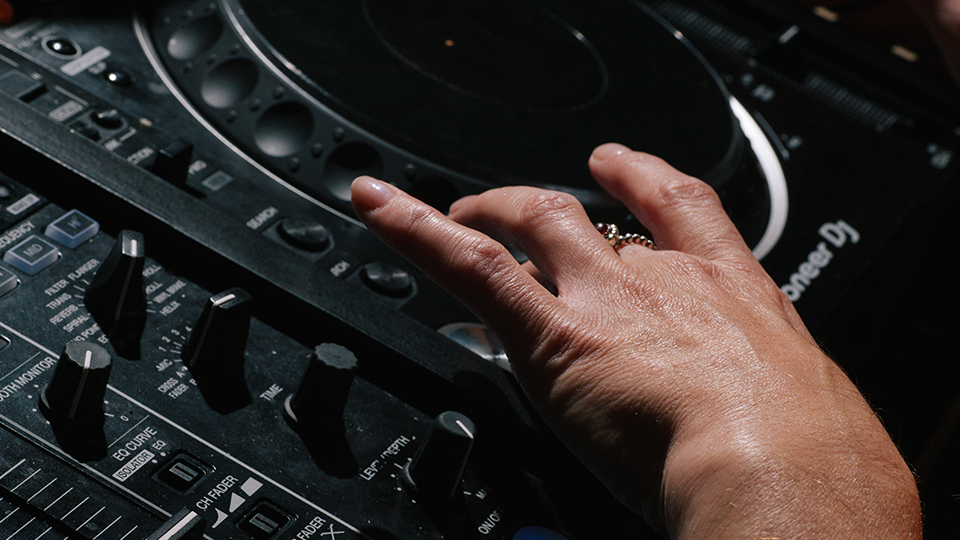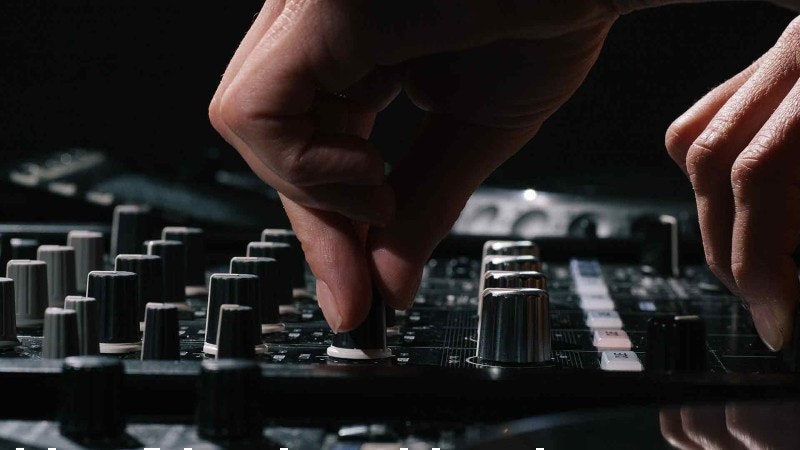
■ Features
Wondering what equipment you need to start DJing? We've created a list of DJ equipment, covering DJ decks for beginners, all the way to professionals.
If you're keen to build a DJ setup of your own, you'll require a collection of basic DJ equipment to get started. There's no definitive answer to what equipment a DJ should have. Rather, it's possible to customise a full DJ setup to your specific needs, and it's encouraged to try as many different formats of DJing as possible, whether that's learning how to DJ on a laptop, with turntables, a MIDI controller or a CDJ setup.
Below, we've compiled some of the most common home DJ setups to help you decipher your best fit, before you go investing in any expensive gear.
A full DJ setup should consist of two decks, which are either vinyl turntables or CDJs that each play music. You'll also need a DJ mixer that helps to blend each track into the next, continuously.
To hear the signal that is being made by the music, you will require monitoring speakers, with an optional amplifier to control the volume of the sound source.
DJ headphones are another essential piece of kit, these are used for 'cueing' or preparing one track whilst the other plays out of the speakers to the audience.
Using records on vinyl turntables is arguably the most tangible way to listen to music. Why are vinyl turntables important to DJing culture? Entire genres and cultures have been bred from turntablism and the sampling of vinyl records, due to its durable and timeless analogue technology. When DJing, two turntables are required to mix each record from deck number one into deck number two, via the mixer. Once a track has been mixed out from the other, you can start to mix another track from the previous deck back in.
The technique of ‘scratching’ involves moving a record back and forth on a turntable to produce a repetitive, morphing sound. This is often demonstrated best using single sounds or acapella records. With a turntable, you have to find the first beat of each track to cue up in the headphones and release into the mix by rewinding and fast-forwarding the record.
Are CDJs essential to a DJ setup? In recent years, CDJs have become a favourable and more accessible format for budding DJs. An advantage of using CDJs is that when you're scratching, the needle can't 'skip' like it could on a record when utilised. Another advantage of using CDJs is that you can just cue back to the beginning of the track by pressing the ‘cue’ button, as opposed to rewinding the record and finding the first beat again. All of the music you use on CDJs can also be transferred onto a semi-unlimited USB stick or storage device that you can carry around.
What is the importance of a DJ mixer? As the name suggests, the purpose of a DJ mixer is to blend one channel or track into another over a continuous basis. A recording or live performance of said actions is called a DJ mix. The mixer gives complete control over the volume coming from each deck. This allows you to blend tracks into each other at a consistent level. You can also separate certain frequency bands such as bass (low), mid and high frequencies, allowing you to incorporate different parts of the sound spectrum from each channel.
Certain mixers also come equipped with effects such as reverb, delay and filtering to help you in the blending process during the transitions from track to track. These effects can also be used creatively on each channel of the mixer, which corresponds to the signal from each deck/turntable. The mixer is often the final step in the audio sequence, controlling what you hear from the speakers.
DJ controllers, AKA MIDI controllers, can be used with a laptop as an affordable and entry-level digital emulation. They typically consist of a mixer and turntables combined into an all-in-one interface. A controller triggers corresponding parameters inside software when connected to a laptop. An advantage of using a controller is its portability, whereas other formats may not be so easy to transport.
Do I need DJ software? Software like Serato, Traktor, and Virtual DJ can be used as a digital emulation of turntables. Programs like rekordbox also allow users of software and CDJs to collate entire libraries of music and input information into them such as BPM, which can help when beatmatching tracks. An advantage of this is the portability of the music and that the music you will use is digitised. A lot of digital software offers to 'sync' or synchronise your tracks together. This function automatically beat-matches them, allowing you to focus on mixing the tracks via fading volume or EQ parameters.
Why are the speakers so important? For both yourself and the audience to hear the tracks you are mixing, you will require a set of speakers. Monitor speakers (or 'Monitors' for short) for home studios are favourable among DJs who practice at home. PA Speakers would be an important asset to a DJ setup if you need to supply the sound at a venue e.g. a wedding or small bar with no soundsystem setup
Why do you need headphones to DJ with? Headphones are to be plugged directly into the mixer. They are used in DJing for 'cueing' or preparing one track, whilst the other plays out of the speakers to the audience. Both decks can be heard independently or together and with most mixers, you can adjust the balance between each track in the headphones. This aids the mixing process.
Volume coming through the headphones can be controlled from the mixer. DJ headphones are often held on one ear to ensure you can hear what's coming out of the speakers together with what's being prepared or 'cued'.
What DJ accessories do I need? A flight-case or soft-case will ensure any DJ equipment remains in the condition intended when in transit. Oftentimes, custom-made protective cases and bags are available for a wide variety of controllers, CDJs, mixers, decks and headphones as an industry standard.
Mixing on turntable setups can be considered DJing or 'beatmatching' in its most original format. Entire cultures and movements have been forged from the utilisation of vinyl records.
Dynamics in the tracks are often visible on close inspection, allowing you to see loud and quiet parts of a track. Vinyl is a lossless format boasting the highest possible quality of audio with a warm analogue feel. Recordings that are mastered to vinyl record tend to have more dynamic audio frequencies. Many vinyl records come with a download code for the digital files when purchased too.
An advantage of using CDJs is that you can use rekordbox, which will help you navigate your music quickly and easily when looking for the next track to mix in. You can loop excerpts of your tracks on the CDJ, e.g. 8 bars, 4 bars, 2 bars, etc. Rekordbox will also help sync loops you create on the CDJ, with the other track on the other deck. An ethernet cable can be used to connect both of the CDJs, allowing you to use the music library from just one USB across two CDJs. The waveform of the track is visible on some CDJs, allowing you to see when loud and quiet parts of a track are.
A Pioneer setup will typically consist of two Pioneer Turntables or Pioneer CDJs and one Pioneer mixer.
Pioneer is the leading, industry-standard CDJ manufacturer. Their products are used in clubs and festivals worldwide. Pioneer manufactures some of the most comprehensive DJ mixers in the world, all of which boast an array of in-built effects.
If you don't already, it's likely that you'll use a Pioneer set up at some point in your DJ career, particularly when you start getting booked for DJ gigs.

Ultimately, there are many different DJ setup options dependent on price and usage, it just takes some research as well as trial and error to find the right DJ equipment for your specific needs.
If you don’t have access to decks at home, you can book one of Pirate's DJ studios in most UK cities, the US and Germany. Here, you'll find the same DJ equipment clubs use.
If you've decided you really want to invest, eBay and Facebook Marketplace are some of the best places to buy DJ equipment online. How much DJ equipment costs depends on many factors and one of the best ways to keep the price down is to go for second-hand gear.
